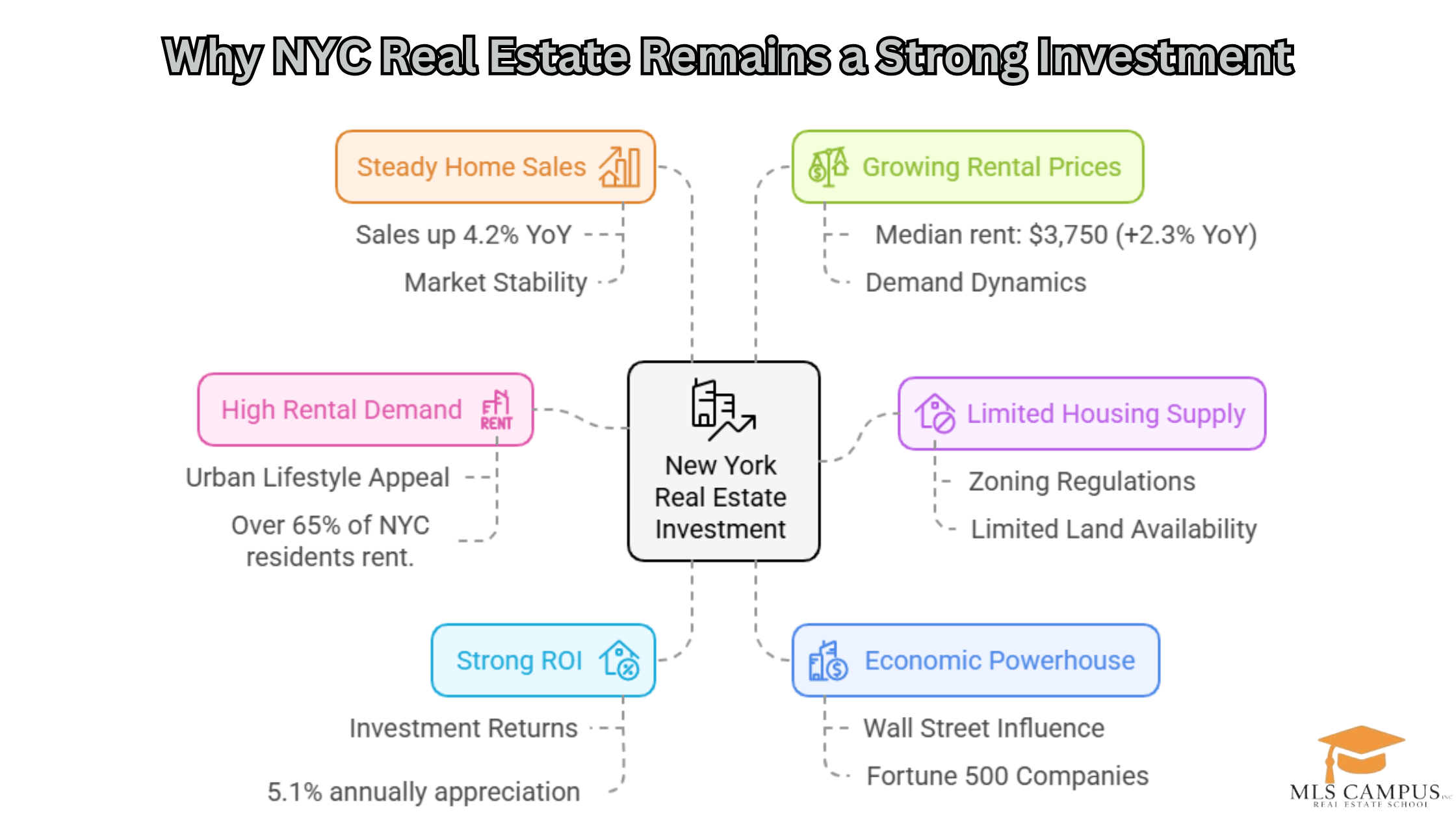Is it Worth Investing in New York Real Estate?

For decades, New York real estate has created wealth for investors—but in 2025, is it still a good investment? With rising home prices, evolving rent laws, and shifting demand, some wonder if the golden era is over. However, high rental demand, a limited housing supply, and steady appreciation continue to make NYC a prime real estate market.
Whether you’re looking to flip properties for quick profits or hold assets for long-term rental income, understanding current market trends, emerging neighborhoods, financing options, and risks is crucial. This guide breaks down everything you need to know before making your next investment move.
Why New York Real Estate Remains a Strong Investment
Despite being one of the world’s most expensive real estate markets, New York continues to offer profitable opportunities for investors. The city’s housing market is characterized by high demand, limited supply, and an evolving economic landscape influencing property values.
1. Key Market Trends in 2025
Several indicators suggest that New York real estate remains a worthwhile investment this year:
- Rising Home Sales – According to the New York State Association of REALTORS®, home sales have increased by 2% year-over-year, reflecting renewed interest in property ownership. (Zillow).
- Rental Price Growth – The median rent in New York City is approximately $3,750, marking a 3% increase from 2024, according to Houzeo.
- Surge in Pending Sales – A 5% increase in pending sales suggests sustained demand from buyers.
- Mortgage Rate Adjustments – With the 30-year fixed mortgage rate stabilizing at 6.75%, financing is slightly more affordable than in 2024.
- Inventory Shortage – Housing supply remains limited, with available listings declining by 8% year-over-year, keeping property values high.
2. Why NYC Attracts Investors
New York remains one of the top destinations for real estate investments due to:
- Economic Powerhouse: New York City is home to Wall Street, Fortune 500 companies, and global enterprises, ensuring a strong job market and a steady influx of professionals seeking housing.
- Strong Rental Market: Over 65% of NYC residents rent rather than buy, creating a stable rental market for rental properties, especially near business districts and universities. As of January 2025, the median rent is $3,750, reflecting a 3% increase from 2024.
- Limited Housing Supply: New York’s strict zoning regulations and high construction costs limit new developments, keeping property values stable and preventing market oversupply.
- Proven Property Appreciation: Despite market fluctuations, NYC real estate has historically appreciated at an average annual rate of 1%, making it a solid long-term investment.
- Shifting Neighborhood Demand – The hybrid work model has increased demand for outer boroughs like Brooklyn and Queens, where buyers seek more space at competitive prices.
Best NYC Neighborhoods to Invest in 2025
Choosing the right location is crucial if you’re considering investing in New York. Here are NYC’s top investment areas:
1. Manhattan – Premium Investment Market
- Hudson Yards – NYC’s newest luxury district with ultra-modern high-rises and premium rentals.
- Financial District – A fast-growing residential hub attracting professionals who seek proximity to Wall Street.
- Harlem – One of Manhattan’s last affordable areas, with 15% appreciation over the past three years. Median home prices are $820,000, well below the Manhattan average of $1.2M.
2. Brooklyn – High Growth & Rental Demand
- Williamsburg – A high-demand neighborhood with an active arts scene and excellent nightlife.
- Bushwick – Attracting creatives and tech workers, this area has seen a 30% rise in property values over five years.
- Downtown Brooklyn – A booming commercial and residential hub, seeing increased demand from investors and tenants.
3. Queens – Long-Term Growth Potential
- Long Island City – Luxury high-rises with strong rental demand due to its proximity to Midtown Manhattan.
- Astoria – A diverse community with lower home prices but high rental demand, offering a strong return on investment.
4. Emerging Areas with High Growth Potential
While traditional investment hubs remain strong, some up-and-coming areas offer significant potential for appreciation and rental income:
- The Bronx
- South Bronx – Experiencing large-scale development projects and improved transportation, making it a growing hotspot for investors.
- Mott Haven – Known for its affordability and rapid gentrification, this area attracts young professionals and creative entrepreneurs.
- Staten Island
- George – Ongoing waterfront redevelopment and new residential projects are increasing its appeal to investors.
- Tottenville – Offers a suburban atmosphere with rising home values, making it ideal for long-term investors looking for steady appreciation.
Property Types in NY Real Estate Investments
When investing in New York real estate, choosing the right property type is critical for maximizing returns and managing risks. NYC offers a range of property types, each with distinct benefits, financial obligations, and regulatory considerations.
1. Condominiums (Condos)
Condos provide full ownership of the unit and allow owners to rent or sell freely without board approval. They tend to have higher purchase prices and monthly maintenance fees but offer strong appreciation potential and easier financing options.
2. Cooperative Apartments (Co-ops)
Co-ops are more affordable than condos but have strict board approval processes and subletting restrictions. They are best suited for long-term ownership rather than short-term rental investments.
3. Multi-Family Properties
Multi-family properties, such as duplexes and apartment buildings, offer investors a consistent source of rental income. These properties require a higher initial investment and more hands-on management, but they provide strong returns over time.
4. Townhouses & Brownstones
Townhouses and brownstones offer full ownership with no HOA fees and tend to appreciate significantly over time. However, they require higher maintenance costs and larger down payments, making them more suitable for experienced investors.
5. Mixed-Use Properties
Mixed-use properties, which combine residential and commercial spaces, provide a diversified income stream but often come with higher property taxes and complex leasing arrangements.
Short-Term vs. Long-Term Investment Strategies
- Flipping (Short-Term): Best for emerging neighborhoods like Bushwick and South Bronx. It requires renovation expertise and market timing but offers 10-15% profit.
- Buy & Hold (Long-Term): Best for stable rental income in high-demand areas like Williamsburg and Long Island City. This strategy has lower risk and benefits from a historical 5.1% annual appreciation.
Potential ROI Based on Investment Type
Investors in NYC real estate can expect different returns based on property type:
- Luxury Condos (Manhattan, Long Island City): 3-5% annual appreciation with premium rental rates due to high demand from professionals and international buyers.
- Multi-Family Properties (The Bronx, Brooklyn): 5-8% cash-on-cash return with steady rental income and low vacancy rates, making them ideal for long-term investments.
- Fix-and-Flip (Bushwick, South Bronx): 10-15% profit margins in gentrifying areas, offering high appreciation potential for short-term investors.
Risks and Challenges: How to Overcome Them
Investing in New York real estate presents unique challenges that investors must carefully navigate. While the market offers strong appreciation and rental income potential, some obstacles can affect profitability and long-term success.
⚠️High Property Taxes – New York’s property taxes, particularly in Manhattan and Brooklyn, are among the highest in the U.S.
💡 Solution: Consider investing in The Bronx or Staten Island, where taxes are significantly lower.
⚠️Strict Rent Control Laws – Rent stabilization laws restrict annual rent increases, limiting profit potential.
💡 Solution: Focus on new developments or market-rate properties that are exempt from these restrictions.
⚠️Market Volatility– Economic downturns or interest rate hikes can impact property values.
💡 Solution: Adopt a long-term investment mindset and diversify property types.
Financing and Investment Strategies
- Leverage Mortgage Options – Investors can choose between fixed-rate mortgages (offering stable payments over time) and adjustable-rate mortgages (ARMs), which start with lower rates but can increase later. The right choice depends on investment goals and risk tolerance.
- House Hacking – This strategy involves buying a multi-unit property, living in one unit, and renting out the others to offset mortgage costs. It’s an excellent option for first-time investors looking to generate rental income while reducing their personal housing expenses.
- Private Lending – Some investors opt for private lenders or hard money loans instead of traditional mortgages. These loans have higher interest rates but provide quick funding, making them ideal for fix-and-flip investments or competitive property acquisitions.
Foreign Investment in NY Real Estate
- Regulations for International Buyers – Foreign investors must comply with U.S. tax laws, including the Foreign Investment in Real Property Tax Act (FIRPTA), which imposes withholding taxes on property sales. Additionally, many U.S. banks require foreign buyers to make larger down payments and meet stricter financing criteria.
- Impact on Pricing – High interest from international buyers, especially from Asia, the Middle East, and Europe, has contributed to rising property values in NYC. Foreign demand for luxury properties in areas like Manhattan, Brooklyn, and Long Island City often leads to increased competition and appreciation in these markets.
Key Considerations Before Investing
Before purchasing property in New York, investors should carefully evaluate the following factors:
- Location Selection – Rental income, property appreciation, and long-term success depend on neighborhood selection.
- Budget & Financing – NYC requires a high entry cost, including down payments, taxes, and maintenance fees.
- Investment Strategy – Consider whether your focus is short-term rental income or long-term property appreciation.
- Property Type – Condos, co-ops, and single-family homes have distinct regulations and financial obligations.
- Market Trends – Stay updated on vacancy rates, rental demand, and economic indicators.
- Legal & Regulatory Environment – NYC has strict rent control laws. Understanding tenant rights, eviction regulations, and property management laws is crucial.
Tips for Successful Real Estate Investing in NYC
Investing in New York real estate can be complex, but the following strategies can improve your chances of success:
- Work with Local Experts: Partner with experienced real estate agents, attorneys, and financial advisors familiar with the NYC market.
- Conduct Thorough Research: Analyze market trends, neighborhood growth, and comparable property values before offering.
- Network with Other Investors: Join local real estate groups and online forums to learn from experienced investors.
- Negotiate Wisely: Strong negotiation skills can help secure favorable deals given the market’s competitive nature.
- Exercise Patience: Finding the right investment opportunity takes time. Avoid rushing into deals without proper due diligence.
Final Thoughts: Is New York Real Estate Worth It in 2025?
New York remains one of the world’s most sought-after real estate markets. Despite high costs and regulatory challenges, the city’s economic strength, rental demand, and limited housing supply make it a promising investment destination. However, success in this market requires careful planning, thorough research, and a well-defined investment strategy.
The rewards can be substantial for those willing to navigate the complexities of NYC real estate. Whether seeking rental income or long-term appreciation, New York continues to be a resilient and attractive market for savvy investors.
Ready to Invest in New York Real Estate? Let MLS Campus Help!
Ready to turn knowledge into profit? MLS Campus provides real estate license courses designed to help you master the NYC market.
Whether you’re a beginner or an experienced investor, our step-by-step training gives you the tools to succeed. Don’t wait—start building your real estate portfolio today!
👉 Contact MLS Campus Today to learn more and sign up!
30 Days Limited Money Back Guarantee Policy
If you decide you’re not 100% satisfied within the First 30 Days of your initial purchase, simply contact us by email and request a cancellation and full refund. You will receive a full refund of your purchase price. If the final exam has been taken, a refund can not be issued. The Real Estate Exam Prep Master and the Exam Prep Math, if purchased separately are not refundable.
Course Duration
The course is active for six months from the date of purchase. We offer the 7th month for free if needed. If your course has been active for 7 months or more, you can purchase one-month extensions. It is possible to have the course extended by up to one year by purchasing monthly extensions online.
Customer Support: Call us at (877) 331-6235 or Contact us by Email
If we can assist you with Technical Support, General License Inquiries or Questions about Course Material please contact us.
Questions about course material: An Instructor is available Monday through Friday a week from 9 am to 7 pm (EST)
Technical Support or any other questions: Our office staff are available Monday through Friday a week from 9 am to 7 pm (EST)
We do our best to reply promptly to emails on Weekends
*Except for Major Holidays
Join Over 100,000 Students Enroll With MLS Campus now
Become Part of MLS Campus School to Further Your Career.












